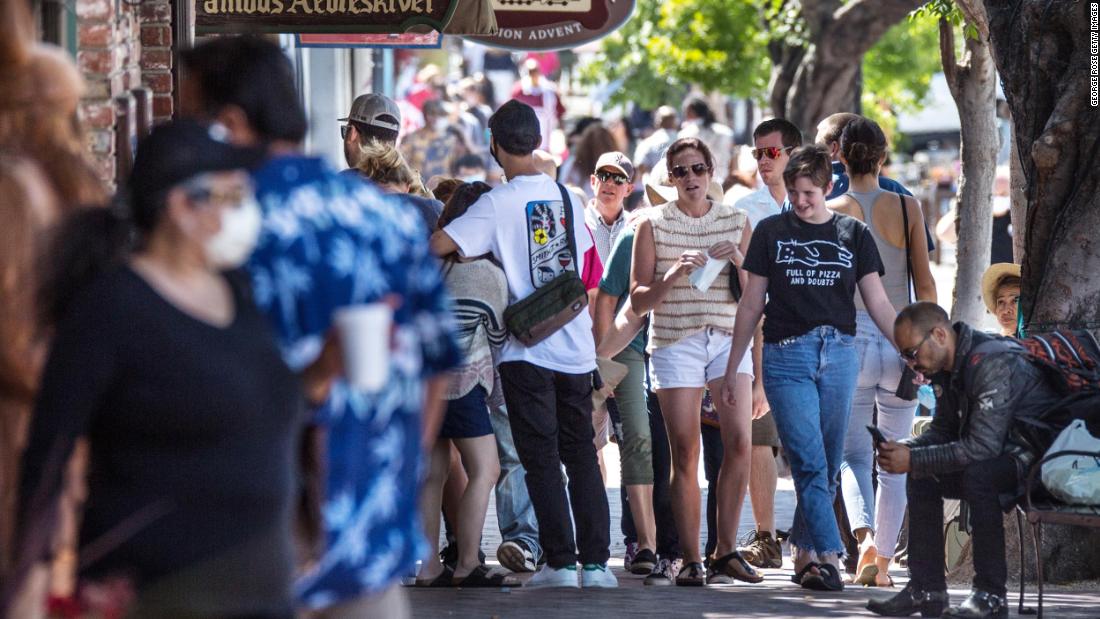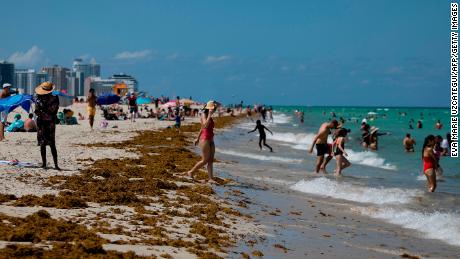California, Texas and Florida set records for new daily cases
The three most-populous US states set those records while nationally, 34,720 new cases were reported Tuesday in the US — the third-highest number of new cases reported in one day since the beginning of the pandemic, based on a data archive kept by Johns Hopkins University. The two days with more cases were both in April.
And while some politicians say that increased testing is the cause of increased positive cases, that is not necessarily so, said Michael Osterholm, director of the Center for Infectious Disease Research & Policy at the University of Minnesota.
“This is not an artifact of just more testing at all,” he said.
Texas Gov. Greg Abbott urged people to stay home due to the surge, with some health officials calling for a stricter stay-at-home order.
In the nation’s most populous state, California obliterated its previous single-day high with 7,149 cases reported on Tuesday, according to state Department of Public Health. The previous record, set the day before, was just more than 5,000. Hospitalization and ICU rates due to the virus are also at an all-time high in the state.
Gov. Gavin Newsom pleaded with Californians to think of others by wearing masks, keeping a safe distance and increasing handwashing. Loosely quoting Scripture, Newsom implored residents to “love thy neighbors, like yourself, please.”
Acknowledging that younger people tend to feel safer returning to normal, Newsom said, “be careful about Mom and Dad, and careful about your mother-in-law, your father-in-law, your grandparents.”
Arizona is currently seeing the highest number of new coronavirus cases per capita of any state in the country, and more new cases per capita than any other state besides New York or New Jersey has seen, according to a CNN analysis of data from Johns Hopkins University.
In Louisiana, Gov. John Bel Edwards said he plans to issue a new proclamation on Thursday extending the Phase 2 restrictions under the current order another 28 days.
“Simply put, we’re heading in the wrong direction. We have more cases than we can justify just by the fact that they’re doing more testing,” Edwards said.
Cases rise in at least 26 states
At least 26 states are seeing a rise in cases compared to the previous week, data from Johns Hopkins University show. Those states are Arizona, Arkansas, California, Colorado, Delaware, Florida, Georgia, Hawaii, Idaho, Iowa, Kansas, Kentucky, Michigan, Mississippi, Missouri, Montana, Nevada, Ohio, Oklahoma, South Carolina, Texas, Utah, Washington, West Virginia, Wisconsin and Wyoming.
It suggests a somewhat slower increase in deaths than the last forecast. On June 18, the CDC’s ensemble forecast predicted 135,000 deaths by July 11.
Many of the models take into consideration shelter-in-place orders, relaxing of restrictions and population movements.
“We stopped the treatment too early,” CNN chief medical correspondent Dr. Sanjay Gupta said. The result could be “exponential growth” of cases.
But many places remained unprepared and reopened far too soon and far too quickly — leading to the latest surges, experts have said.
Hospitals should plan for surge of patients
In Arizona, hospital systems need to put emergency plans in place due to the increase in new Covid-19 cases, said Will Humble, executive director of the Arizona Public Health Association, on Wednesday.
He predicted the state’s hospitals will go into surge capacity mode by July 4.
Arizona’s public health agency says 88% of ICU beds and 86% of inpatient hospital beds in the state are now in use due to a surge in Covid-19 cases. Both are record highs since the state started reporting the statistics in late March.
“What I’d be focusing right now on is sounding the alarm to our hospital systems to get ready,” Humble said. “Because no matter what you do at this point, given where we are at the increase in cases, the exponential growth, taking into consideration the incubation period for this virus, we’re going to go into surge capacity mode by the Fourth of July.”
Health officials in the state need to “get those emergency plans in place because, at this point, I don’t see an alternative but to go to crisis standard prepare in Arizona probably, probably in 10 days, maybe less,” Humble said.
“We are now projecting that our intensive care units will fill up over the next two weeks. And the reason that’s significant is because we know as ICUs start to fill up, mortality goes up,” Hotez told CNN on Wednesday.
“It gets harder and harder to manage all of those patients, even if you have — even if you’re fully staffed,” he said. “So, this is when you see mortality rates really start to accelerate.”
Hotez would like to see a lockdown like the one implemented at the end of March, he said. “Because things are so dire, we have to intervene now and we have to be very aggressive at implementing stay-at-home and other social distancing measures.”
“This time, we have to go back to what’s called ‘containment mode,’ meaning less than one new case per million residents per day,” Hotez said.
Texas has temporarily suspended alcohol permits of at least 12 bars in the state found to be violating coronavirus-related protocols.
Some states remaining steady
Meanwhile, cases in 10 states are holding at a steady pace. Those states include Illinois, Louisiana, Minnesota, Nebraska, New Mexico, North Carolina, Oregon, Pennsylvania, Tennessee and Virginia.
Cases are on the decline in 14 states: Alabama, Alaska, Connecticut, Indiana, Maine, Maryland, Massachusetts, New Hampshire, New Jersey, New York, North Dakota, Rhode Island, South Dakota and Vermont.
Experts have expressed concern that even states who may be seeing temporary dips in cases could begin seeing dangerous rises again as they begin reopening and more residents venture out.
New Jersey Gov. Phil Murphy said the quarantine advisory is “not a polite recommendation,” adding it applies to residents of the state as well who traveled to other states that fit the categories aforementioned.
Murphy urged younger populations to continue heeding guidelines as officials across the country report more young groups get sick.
“We’ve seen an INCREASE in the percentage of #COVID19 cases between the ages of 18-29,” he said on Twitter. “Do the right thing. Wear a mask. Keep your distance. Wash your hands. Don’t be a knucklehead.”
In New York City, Mayor Bill de Blasio tweeted Tuesday beaches will be open for swimming starting July 1.
EU considering if US travelers will be allowed in
Meanwhile, European Union member states are discussing barring visitors from several countries, including the US, EU officials told CNN.
The EU is working with member nations to decide which travelers would be considered safe to visit the bloc starting July 1. That criteria will be focused on the “circulation of the virus,” one EU diplomat said.
In a statement, the State Department said it advised Americans to continue checking the websites of relevant embassies for information including on entry restrictions and quarantine policies.
CNN’s Kylie Atwood, Jen Christensen, Ethan Cohen, Maggie Fox, Cheri Mossburg and Konstantin Toropin contributed to this report.
![]()














